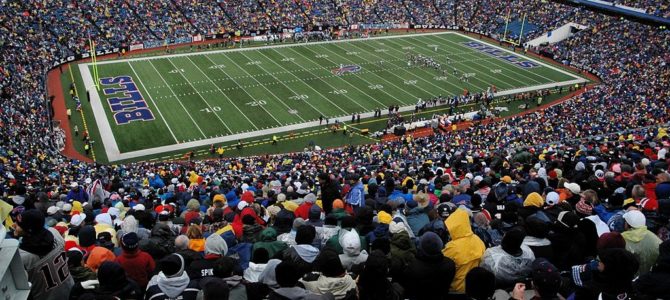
The fall of New York Gov. Andrew Cuomo is meeting celebration from a broad cross-section of interests. His ouster on the grounds of being a serial sexual harasser may not be a perfect case of justice triumphing, since it helps his party sweep under the rug his (and other Democrat governors’) criminally negligent role in fatally exposing nursing home residents to COVID-19. But critics of the thuggish Cuomo can at least take satisfaction in seeing him sent packing in disgrace.
Among those who may be happiest about it are Terry and Kim Pegula, the billionaire couple who owns the NFL’s Buffalo Bills. According to Forbes, Terry Pegula, who made his money fracking natural gas, is worth $5.4 billion. But Pegula still wants the taxpayers of the Empire State to cough up the money to build him a new stadium, a cost estimated as high as $1.5 billion.
According to the Buffalo News, the team is in negotiations with Erie County Executive Mark Poloncarz and Cuomo’s office after announcing hopes to build a new stadium in Orchard Park to replace Highmark Stadium, the Bills’ current home. Built in 1973, the stadium underwent renovations in 2014 and 2018 that cost the state and the county $95 million, with the Bills kicking in $35 million. Their lease there expires in 2023.
Nationwide Rent-Seeking
If the Bills don’t get what they want, another city and state will likely give it to them. The city of Austin, a fast-growing and far larger market than Buffalo, has been suggested to lure the Bills, away from their cold-weather home to football-mad Texas. Few politicians are more interested in preventing that from happening than New York Lt. Gov. Kathy Hochul, who will replace Cuomo after his resignation goes into effect.
While Cuomo has been too distracted by his troubles to be actively involved in the talks, the expectation is that Hochul, a Buffalo native, will be even more eager to give taxpayers’ money to Pegula. If she hopes to keep the office in the next election, she’ll want support from her hometown, and “saving” the Bills may help in that regard.
Indeed, last week Hochul insinuated the state will do everything possible to keep the Bills in Buffalo. “We are committed to keeping the Buffalo Bills in the city — stop, period, that’s it,” she said.
That’s good news for the Pegulas and for the team’s supporters who take pride in the Bills being, like the Green Bay Packers, relics of an era when smaller rust-belt cities were not overlooked for major league sports franchises in favor of larger markets. But it’s bad news for New York’s taxpayers.
Stadiums Aren’t Worth the Cost to Taxpayers
Such shakedowns are a familiar story to those who follow the sports industry. New stadiums and indoor arenas have sprouted up all over the country in recent decades. In many cases, they’ve been built with taxpayer funds. Those promoting them promised economic benefits to cities and states, arguing new stadiums boost local economies and provide employment and tax revenue.
Teams do provide cities and regions an almost tribal identity. No mayor or governor wants to be remembered as the one who “lost” a beloved team the way New York City let Major League Baseball’s Giants and Dodgers leave for the West Coast in 1957. They left behind legions of disillusioned fans like Sen. Bernie Sanders, who still holds onto myths about greed stemming from that event, which he says helped turn him into a socialist.
By contrast, politicians who agree to even the most egregious deals providing teams new stadiums virtually free of charge are rarely punished, even if the net effects on taxpayers are overwhelmingly negative. Economists from left to right have consistently debunked sports teams’ claims, with a growing consensus saying they aren’t worth the price. Even those of us who love sports have to admit the money most fans spend attending games is often merely transferred from other leisure activities.
There is also little net uptick in employment, and most jobs created by ballparks tend to be part-time and low income. The people who truly benefit are team owners, who profit from ballparks geared to increase income from more luxury boxes, restaurants, and other bells and whistles older venues lack.
Pay Up, Lose Your Team, Or Roll the Dice
In places like New York City, the kind of squeeze play being put on by the Pegulas doesn’t work. No one believed baseball’s Yankees or Mets could be successfully bribed to leave the Big Apple. Their new stadiums, which both opened in 2009, were built by the teams through tax-free bonds from the government, with the government financing new infrastructure around them. But since governments exist to build infrastructure, those gifts were more defensible.
Another recent instance in which government resisted this kind of blackmail was in Oakland, which in 2017 refused to match the largesse Las Vegas lavished on the NFL’s Raiders franchise. As a result, the team moved. In that case, the city was simply too broke to compete with a bigger market that could finance government subsidies for a new stadium with tourism-related taxes.
The notion that Buffalo or New York can afford to make a gift of this size to the Pegulas in the midst of budget crises and a struggling economy is risible. But thanks to Hochul’s political needs and other local politicians’ fears of the consequences of letting the Bills abscond to Texas, that is exactly what may happen.









